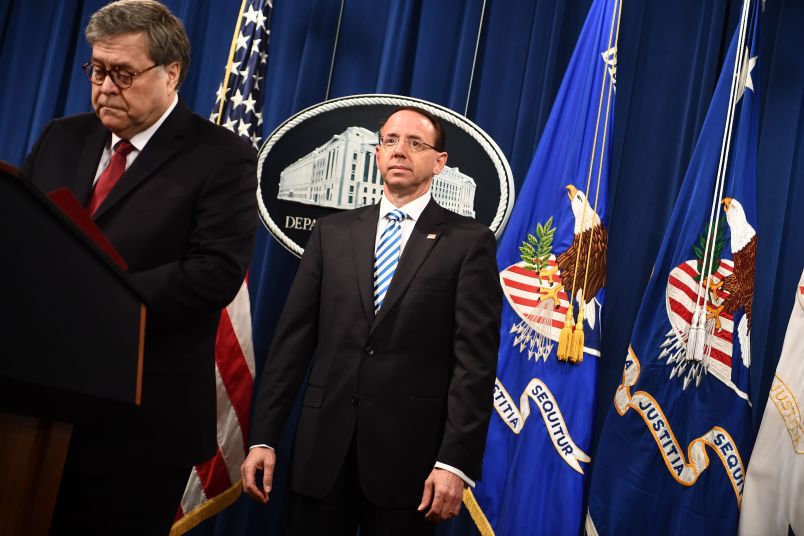I had not noticed until this morning (when TPM Reader TM flagged it to my attention) that Rod Rosenstein responded (not terribly positively) to my post on the Comey Memos IG report (“Of Course Comey Was Right to Share the Memos”).
Check out this double-negative logic: "no reason to believe the others in the .. chain of command weren’t compromised by Trump’s corruption and efforts to end the investigation" — ignoring the fact that EVERY agent and prosecutor was still working on it. https://t.co/HwcC3N68ur
— Rod Rosenstein (@RodRosenstein) August 30, 2019
Allow me to respond.
First, I preface all this by reaffirming that despite all my criticisms of Rod Rosenstein, sometimes verging into mockery, in the final analysis he appointed the special counsel and, as far as we know, preserved its independence from a lawless President for almost two years. That is Rosenstein’s most important legacy through this whole saga.
Second, I’m not sure what the problem is with “double-negative logic.” The argument makes perfect sense both grammatically and logically, whether or not you agree with the claim. In my Friday post I argued that Comey’s violation of Bureau guidelines were clearly justified by the unique moment of national crisis in which he took his actions. Inspector General Michael Horowitz’s Trump-coddling lambasting of Comey only makes any sense if you studiously, indeed militantly ignore this context. The same applies to Rosenstein even though he clearly knows the context as well or really more intimately than any of us.
I argued two points. First, the public needed to know then what the President had done, why he had fired Comey and how this fit into the larger coverup. More specifically, it made no sense for Comey to hand his memos over to his successors at the FBI or top appointees at the DOJ since he had good reason to think they themselves were or would be compromised by Trump’s corruption and on-going coverup. To this Rosenstein says that in fact “EVERY agent and prosecutor was still working on it.”
Let’s take this piece by piece.
Comey was fired because he wouldn’t drop the Russia probe. Every FBI Agent worked for James Comey. If he was fired for refusing to drop the Russia probe it certainly stood to reason that every agent’s role in the probe was under threat. Prosecutors don’t work for the FBI Director. They work for the Department of Justice. But at that stage of an investigation, in practice a similar logic applies to them.
As I said, simple logic said that their pursuit of the investigation was also under threat. If Comey was fired for refusing to drop the Russia probe then it also stood to reason that others who refused would also be fired or that they were on board with or would bend to Trump’s cover up.
But of course it goes beyond this.
Trump decided to fire Comey in that infamous rageballing weekend at Bedminster (May 6–7, 2017). He came back to Washington with his mind made up and enlisted the help of Attorney General Jeff Sessions and Rosenstein to craft his justification (May 8, 2017). Rosenstein proceeded to do so (May 8–9, 2017). This point is critical. Rosenstein certainly knew that Trump was firing Comey over the Russia probe. Yet he knowingly drafted a memo with a series of pretextual justifications for Comey’s dismissal. Rosenstein’s proffered reasons were not unreasonable in themselves. But they were clearly not the actual reasons. Rosenstein knew this. In this way he made himself part of the coverup.
So not only did Comey have every reason to believe the chain of command was compromised. It in fact was compromised, as Rosenstein’s own actions show.
Now, one of the great mysteries of this whole saga remains how Rosenstein went from helping Trump advance his bad acts and coverups to appointing an outside investigator to investigate them. He remains an unexplained tangle of fidelity to the rule of law and complicity in attacks upon it. I have my theories. But of course only Rosenstein can answer that question. I’m all ears.
The fact that Rosenstein himself made the decision to appoint Robert Mueller itself provides an ample testimony that the chain of command could not credibly oversee the probe. Indeed, that is literally the premise of the decision. But again, there’s a bit more than that. The timeline and contemporaneous reporting makes clear that Rosenstein’s decision was in significant measure driven by the release of the information contained in Comey’s memos, which he had through an intermediary leaked to The New York Times. His decision came a day after the first quotes from the memos appeared in the Times.
Given President Trump’s on-going and often quite public efforts to obstruct, block and shutdown the Mueller probe it is absurd to think that any still secret investigation under the unobserved stewardship of Trump political appointees within the DOJ would have survived. Rosenstein needed the goad of those memos to create the special counsel investigation. That itself makes the point that public exposure of that information was critical.
I should add that this part of my argument doesn’t even require positive bad acts by people working for Trump in the summer of 2017. It simply requires Comey’s reasonable expectations at that moment and responsibility to the country and the rule of law. In fact, we know there were both bad acts and complicity in Trump’s bad acts and attempted subversions of the rule of law. Rosenstein’s claim simply does not hold up. He knows that better than anyone. He was there. Indeed, some of the acts were his own.






